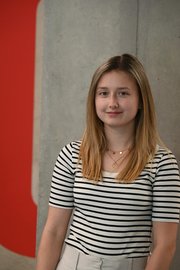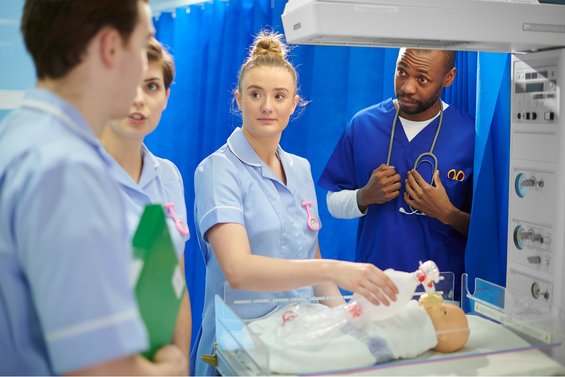
Midwifery Science
In A Nutshell
Profile of the study program
The demands on midwives have become more complex in recent years. Today, midwives are more required to continuously reflect on the latest findings from science and research and to integrate them into their everyday professional life. This paradigm shift opens up new perspectives on their profession for midwives. An evidence-oriented and salutogenetic approach is important here. With the dual degree program in midwifery science, our practice partners and we prepare students for the profession in clinical and out-of-hospital settings.
In the seven-semester program, we focus on the three guiding principles of "Thinking and acting scientifically," "Living healthily as a woman and a family," and "Being a midwife."
- "Thinking and acting scientifically" means: students acquire midwifery and reference science knowledge and use this as a basis for shaping the care of women and families.
- "Living healthily as a woman and family": by becoming familiar with approaches to health promotion in the life phases of family planning, pregnancy, birth, postpartum and breastfeeding, students are enabled to think and act holistically.
- "Being a midwife": we attach importance to imparting subject-specific knowledge in an application-oriented manner. And we are concerned that the students consciously take a look at themselves in their role as midwives.
Study Ambassador

My name is Nelly Stammberger and I am a student ambassador for the midwifery program. Since I study at Coburg University, I can answer your questions directly. So if you want to know what the study program is all about and what the processes are like, just send me an email to: Nelly.Stammberger[at]stud.hs-coburg.de.
Dual study/practice partner
The combination of science and intensive practice in institutions of the health care system represents the basis of the study program. As a prerequisite for the study program, a practical training contract must therefore be in place with one of our practice partners. The contract also guarantees employment with social insurance and a training salary.
Practice during studies
The practical work components are integrated into the course of study and are secured in each semester as practical modules with study content that is coordinated in terms of content and organization. This guarantees that the students get to know different settings in practice. Practice supervisors support the students in their practical work in order to repeat theoretically learned activities. Students are directly prepared for their practical activities in the sheltered "Skills Lab". In addition, a reflection takes place after each practical assignment to discuss and, if necessary, process the experience.


Career perspectives
Midwifery is most likely the oldest profession in the world. And a profession with future prospects. The classic fields of employment are:
- in obstetrics departments of hospitals
- in midwife practices
- in birth centers
- as a freelance midwife
The academic qualification will open up further professional fields for graduates in the future. For example, in the public health system and in counseling centers, but also in management positions in hospitals. In addition, the degree program opens up opportunities to become involved in research and pursue an academic career.
Master's program
After successful completion of the bachelor's program, good graduates have the opportunity to continue their education in the master's program in health promotion.
Study contents
1st to 5th semester
Being a midwife
- Designing birth support
- Caring for mother and child in the postpartum period
- Working as a midwife in the German health care system
- Recognizing and acting in deviant obstetric situations
- Acting in a professional context
- Practical modules (practical phases)
Living healthy as a woman and family
- Understanding sexuality and planning family
- From the unborn to the infant
- Recognizing diseases in women and children
- Non-clinical midwifery work
- Promoting health and working preventively as a midwife
Thinking and acting scientifically
- Basics of scientific work
- Scientific basics
- Communication
- Technology and digitalization
- Midwifery research
6th and 7th semester
- Evidence-based support during pregnancy, birth, postpartum and breastfeeding (state examination)
- Midwifery in an ethical and societal context (state examination)
- Midwifery Research
- Elective module
- Bachelor thesis with accompanying seminar
- Practical state examination in the practical module
The compulsory elective module in the seventh semester can be chosen from the main topics of pedagogy, counseling, business administration, in-depth midwifery science or personnel management.
Study and examination regulations
The study and examination regulations forms the legal basis of the studies. Questions about the contents of the study program can be answered by the international office.
Application and admission
Admission requirements for the study program:
- Contract for academic midwifery training with one of our practice partners, to be submitted by the end of the application phase for your study place. Please note the respective application deadlines of the practice partners.
General admission requirements:
- General university entrance qualification, subject-linked university entrance qualification or university of applied sciences entrance qualification or
- General or subject-linked university entrance qualification for vocationally qualified persons or
- successful vocational training as a health or (children's) nurse, nursing specialist or nurse in another EU country (§ 10 HebG) or
- foreign educational certificates
- if necessary, required language certificates
Further admission requirements according to § 10 Midwifery Act:
- Extended police clearance certificate (not older than three months); to be submitted at the latest by the time of enrollment.
- Medical certificate of medical fitness (not older than three months) to be submitted at the latest by the time of enrollment.
Application
- Information on the application process and admission to the university
- Directly to the online application
